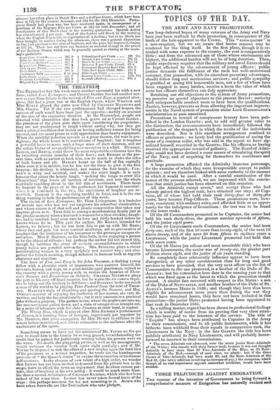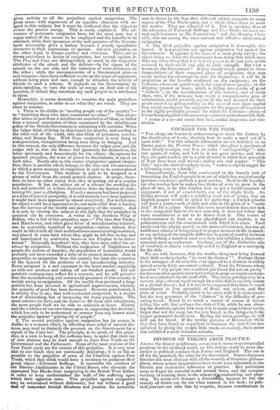THREE PREJUDICES AGAINST EMIGRATION.
Tas rumour of the intention of Government to bring forward a comprehensive measure of Emigration has naturally excited au&
given activity to all the prejudices against emigration. The press teems with arguments of an opposite character with re- spect to this subject, but it must be confessed that the objectors evince the greater energy. This is easily explained. The ad- vocates of systematic emigration have, for the most part, but a vague notion of the means to be employed and the benefits to be obtained, while their ignorance of the real purposes of the Govern- ment necessarily gives a listless because a merely speculative character to their expressions of opinion. Adverse prejudice, on the other hand, is always positive and vivacious. There are no strong prejudices in favour of emigration, but several against it. The Pros and Cons are distinguished, as usual, by the respective attributes of the attack and the defence—by the vigour of the assault on the one side, and the tameness of mere resistance on the other ; while the announcements of a Government plan—a real measure—have been sufficient to stir up the anger of opponents, without being plain and sure enough to stimulate the activity of friends to such a scheme. It depends on the Government, by plain-speaking, to turn the scale of energy on their side of the question, if indeed they entertain any such project as is attributed to them.
Meanwhile, it seems desirable to examine the main prejudices against emigration, in order to see what they are worth. They are three in number.
1. There is the dislike to "sending people out of the country"— to "banishing those who have committed no crime." This preju- dice arises in part from a mischievous association of ideas, or rather from a natural association of ideas occasioned by the mischievous policy of the British Government in colonizing with convicts. When the vulgar think of living on ship-board for months, and settling at the other end of the world, they also think of prisoners, convict- ships, and Botany Bay. With them emigration is next thing to transportation, transportation being next thing to hanging. And in this respect, the only difference between the vulgar poor and the vulgar rich is, that the former feel ignorantly for themselves, the latter ignorantly and benevolently for the others : the aptness for ignorant prejudice the want of power to discriminate, is equal on both sides. Nearly akin to this source of prejudice against emigra- tion there is another which belongs to the time and circumstances in Which a great measure of emigration is said to be contemplated by the Government. This measure is said to be designed as a means of relief from the actual general distress. It seems, there- fore to have no other object than that of getting rid of a surplus population. It has the odious air of a scheme for enabling the rich and powerful to relieve themselves from the burden of main- taining the poor and helpless. If such a measure had been proposed at a time of general prosperity, it would scarcely have been opposed; it might have been approved by almost everybody. For in that case, its object would have appeared to be, not mere relief from a burden, but the increase of the wealth and prosperity of the country. And it is only by viewing the subject in this light that the prejudice in question can be overcome. A writer in the Northern Whig of Belfast, who is full of this prejudice, says—" The idea that Paisley and Manchester, and other great hives of manufacturing industry, can be materially benefited by emigration—unless, indeed, they could be lifted with all their multitudinous manufacturing resources, and placed in some land where they might be left free to buy and sell unmolested by restrictive laws—is too Utopian to be enter- tained." Materially benefited ! why, they have been called into ex- istence by emigration. Without the emigration of Englishmen to people the deserts of America, the population of Lancashire would probably not have exceeded a tithe of its present amount. Just in
proportion to emigration from this country has been the extension of the demand for the products of our manufacturing industry. Every emigrant is a new customer in the home market, supplying
us with raw produce and taking off our finished goods. Let our patriotic contemporary reflect for a moment, and he will perceive that the manufacturing and commercial greatness of this country is mainly owing to emigration. Of the wealth thus produced a large portion has been invested in agricultural improvements, whereby the quantity of good has been increased. However paradoxical, it is strictly true to say, that well-conducted emigration is a means not of diminishing, but of increasing the home population. The more colonies we have, and the faster we fill them with inhabitants, the more people shall we be able to maintain at home. History and the evidence of our own times agree in supporting this doctrine; which has only to be understood to remove from any honest mind the prejudice against "getting rid of people." 2. The second prejudice against emigration has its source in dislike to a measure which, by affording some relief of natural dis- tress, may tend to diminish the pressure on the Government for a repeal of the Corn-law. The principle, so to speak, of this preju- dice, is a wish to keep all the sufferers here, in order that their cry of sore distress may be loud enough to force Free Trade on the Government and the Parliament. Some of the most zealous of the Free Trade party are the owners of this prejudice. It is very near akin to one which they are continually deploring; it is as like as possible to the prejudice of some of the Chartists against Free
a'rade, which they think would have a tendency to postpone their
grand object—Universal Suffrage. It resembles the conduct of the Slavery-Abolitionists in the United States, who dissuade the oppressed free Blacks from emigrating to the British West Indies, in order to keep undiminished the bulk of the suffering upon which their agitation rests. This prejudice against emigration may be entertained without dishonesty, but not without a good teal of somewhat brutish blindness and passion. Its unworthi-
ness is shown by the fact, that although plainly traceable in many organs of the Free Trade party, not a single writer dares to avow the motive. They are ashamed of it. But in -speaking thus of the advocates of Universal Suffrage and Free Trade, we must ex- cept such instances as Mr. CARPENTER * and the Morning Chro- nicle, who are among the most earnest and effective advocates of emigration.
3. The third prejudice against emigration is thoroughly dis- honest. It is a prejudice not against emigration but against the Government. It appears in the form of a mere party outcry; the object being to deter the Government from doing that which more than any other thing that it is in their power to do just now, would redound to their credit and add to their strength. But what a lessors for the Government ! If they should wisely attend to these denunciations of their supposed plans of emigration, they may easily reckon the advantage in store for themselves : it will be in proportion to the benefits conferred on the emigrants ; on the Colonies, whose one grand want is the want of more people ; on the shipping interest at home, which is falling into a state of great " distress "; on the manufacturers of this country, and of every class, who, if the measure were really a comprehensive plan of colonization, would presently rejoice in the new demand for their goods created by giving activity to the mass of now inert capital that would accompany the emigrants for the purpose of investment in the highly-profitable pursuits for which the Colonies—plenty of labour being supplied with constancy—present an inexhaustible field..
* Author of a new and capital little hook, entitled Emigration and Colo-



























 Previous page
Previous page